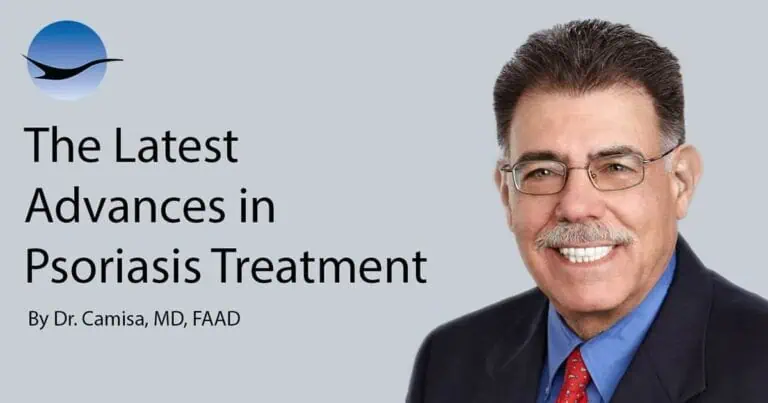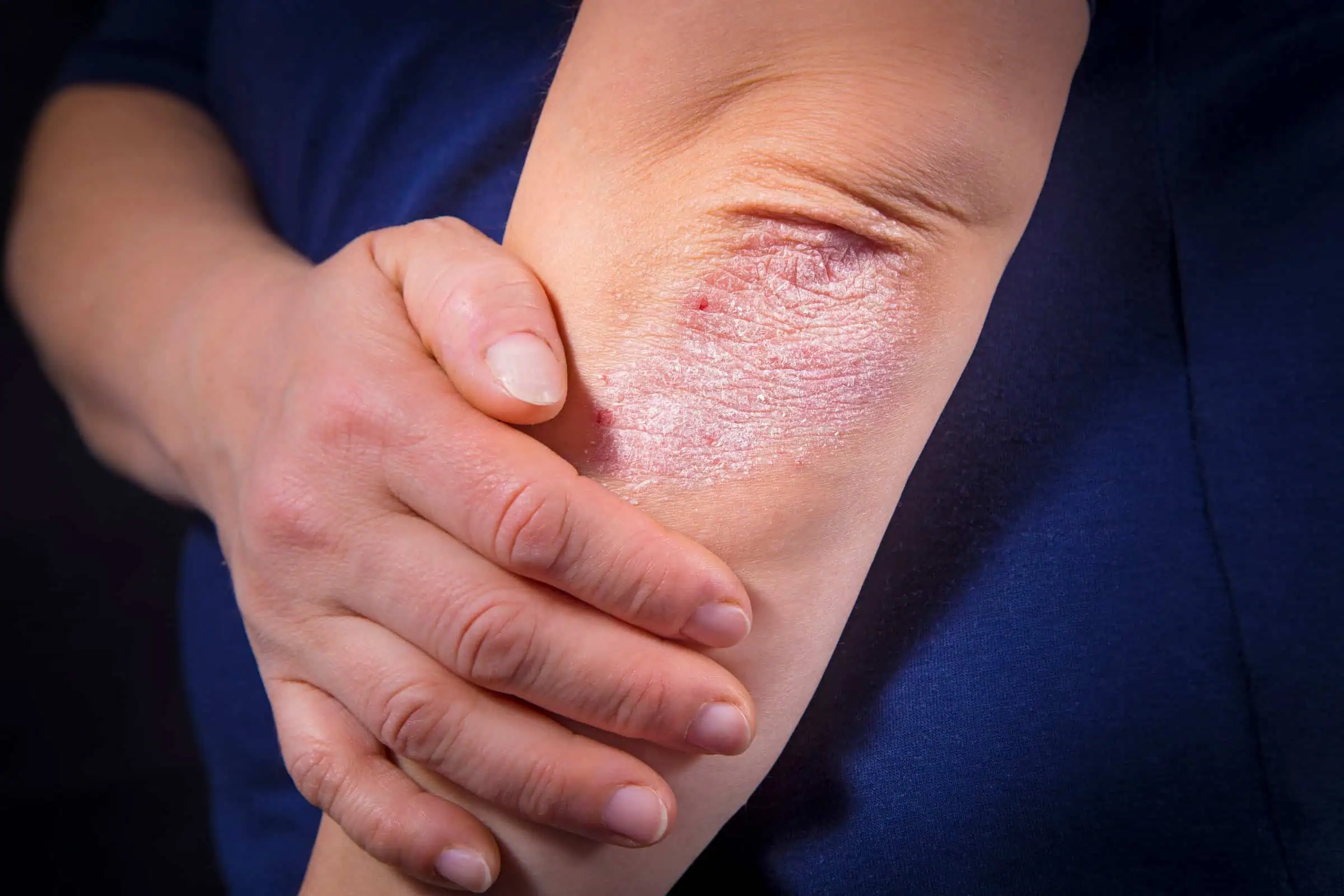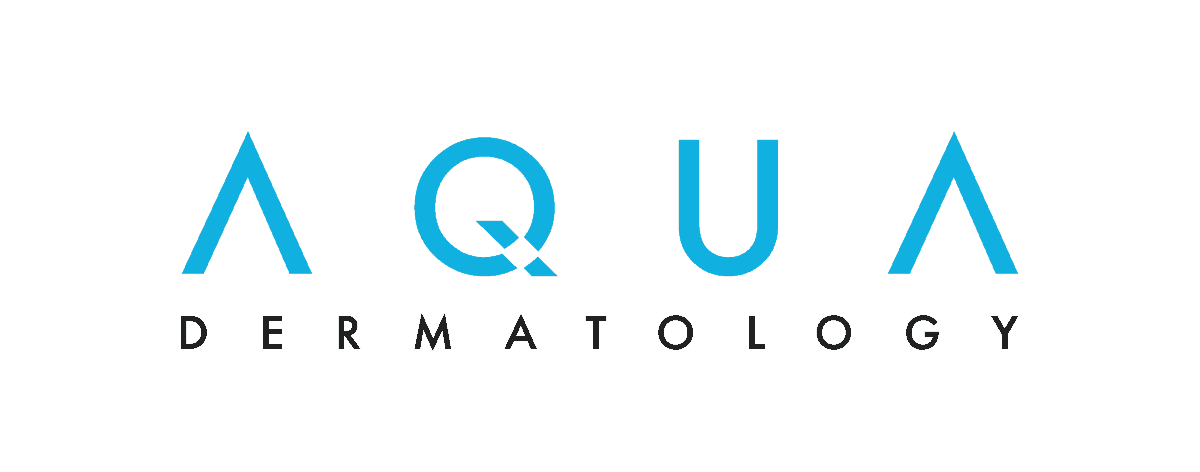The Advances of Psoriasis Treatment

Psoriasis is one of the most common of the rashes treated by Dermatologists. It affects about 3% of the U.S. population. Psoriasis resembles in its appearance another common skin disease called Eczema or Atopic Dermatitis. Here are some tips to help differentiate between the two:
1. Although Psoriasis can occur anywhere on the body, it favors areas of trauma or friction such as the scalp, elbows, knees, hands, and nails.
2. Psoriasis lesions are usually well-demarcated from the normal skin and appear as red dots or plaques that are covered by a white/silvery scale.
3. Psoriasis on the body is usually not itchy (unlike Eczema), but the scalp is usually very itchy.
4. Less commonly, Psoriasis can occur on the face or private area, where it can be confused with other conditions without a specialist’s examination.
5. Some forms of Psoriasis only affect the hands and feet where they may cause significant discomfort and disability.
6. About one-third of patients with Psoriasis will develop an inflammatory arthritis that is similar to rheumatoid arthritis. Psoriatic arthritis is destructive and must be treated.
7. Psoriasis runs in families: having one parent with Psoriasis increases your chance of getting it; both parents increases the risk greatly, and if your identical twin has Psoriasis, you will almost certainly get it.
8. The typical age of onset is in the 30’s, equal in men and women, but it can start at any age and tends to get worse over time without treatment.
The Cause of Psoriasis
When I began training in Dermatology about four decades ago, Psoriasis was considered to be a disease of unregulated rapid overgrowth of the top layer of skin cells. At that point, the intense inflammation was overlooked. The only therapies available for Psoriasis were external coal tar and steroid creams, Ultraviolet Light Phototherapy, and an oral chemotherapy drug called Methotrexate for the more severe cases.
Since that time, there has been an explosion of research into the cause and treatment of psoriasis. We now understand that there is a basic defect in the immune system that leads to inflammation in the skin which triggers the abnormal overgrowth of skin cells. This discovery has allowed pharmaceutical companies to develop many new drugs that slow or block the abnormal immunologic pathway at various points.
At last count, there are now 3 more oral drugs and at least 10 new injectable medications that are highly effective at reducing the body coverage of psoriasis by 75-90%! They are called Biologics because they are antibodies that block a critical factor in the abnormal immune system of Psoriasis. Biologics may be injected in the office or by the patients themselves at home. Some of these same medicines are approved for treating Psoriatic Arthritis as well.
As you can see, Dermatologists have come a long way in the understanding and treatment of Psoriasis. We can usually diagnose it by performing a thorough skin examination to find subtle or hidden areas of the disease such as the navel, tailbone, or pits in the fingernails. In more difficult cases, a skin biopsy can be performed to confirm the diagnosis. Moreover, we now have new effective medicines, with many more on the way.
At Riverchase Dermatology, we specialize in Psoriasis Treatment. We tailor the treatment to the individual patient. Mild cases may still only require the topical creams. Moderate cases may do extremely well with Phototherapy, while the more severe or resistant cases may be better candidates for one of the injectable Biologics. We can also safely combine all of the modalities.
It is important to remember that even though we now have all of these wonderful new high-tech medications available for Psoriasis, there are always risks of side-effects, financial costs, and treatment failures. We can almost always find an alternative or combination treatment that will help you. However, we still do not have the cure for Psoriasis. Whenever a successful treatment is discontinued, Psoriasis will eventually return to its original condition. For this reason, my policy is to continue maintenance therapy for as long as it works while monitoring safety.
As you can see, we have come a long way since the days of the “heartbreak of Psoriasis.” Now we regularly see commercials advertising the new “miracle” drugs showing actors in bathing suits with either clear skin or just a little residual Psoriasis on their elbows. There are celebrities who have come out with their diagnosis and endorse specific biologic drugs. The future is bright! There are many new compounds with different mechanisms of action under development that have a better safety profile for long-term use and potentially, a cure.
Charles Camisa, MD, FAAD
Director, Psoriasis Treatment Center and Dept of Phototherapy



